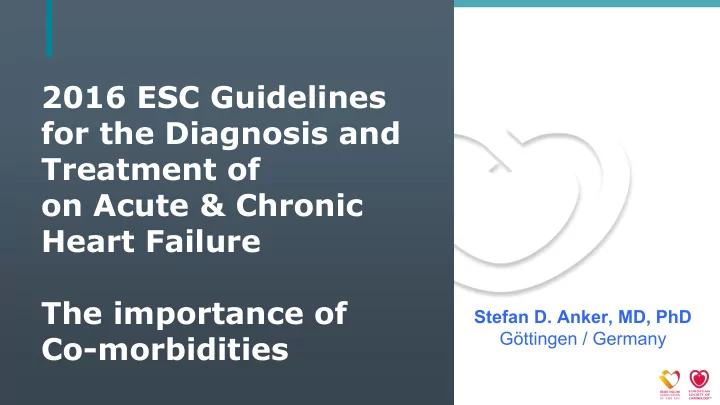

2016 ESC Guidelines for the Diagnosis and Treatment of on Acute & Chronic Heart Failure The importance of Stefan D. Anker, MD, PhD Göttingen / Germany Co-morbidities www.escardio.org/guidelines
Co-morbidities to consider in HF & important studies • CAD / ischemia & Hypertension • Diabetes mellitus & Metabolic syndrome • Sleep apnoea • Depression & Stroke • Anemia and iron deficiency • Renal dysfunction and kidney injury • COPD • Liver & bowel dysfunction • Cachexia & muscle wasting www.escardio.org/guidelines
Co-morbidities to consider in HF & important studies • CAD / ischemia & Hypertension consider empagliflozin • Diabetes mellitus & Metabolic syndrome EMPA-REG-Outcome • Sleep apnoea consider • Depression & Stroke SERVE-HF • Anemia and iron deficiency • consider Renal dysfunction and kidney injury CONFIRM-HF • COPD • Liver & bowel dysfunction consider Hyperkalaemia • Cachexia & muscle wasting (Patiromer, ZS-9) www.escardio.org/guidelines
Importance of co-morbidities in patients with HF www.escardio.org/guidelines
Recommendations for the prevention of thrombo-embolism in patients with symptomatic HF (NYHA II–IV) & paroxysmal or persistent/permanent AF www.escardio.org/guidelines
Treatment of stable angina pectoris with symptomatic HF (NYHA II-IV) with reduced ejection fraction www.escardio.org/guidelines
Recommendations for the treatment of hypertension in patients with symptomatic HF (NYHA II-IV) with reduced ejection fraction www.escardio.org/guidelines
Recommendations for the treatment of other co-morbidities in patients with HF => should be treatment of choice, except in severe renal or hepatic impairment www.escardio.org/guidelines
Statements on empagliflozin in the 2016 HF GL (page 37 of 85) 11.6 Diabetes “Recently, empagliflozin, an inhibitor of sodium-glucose cotransporter 2, reduced hospitalization for HF and mortality, but not myocardial infarction or stroke, in patients with diabetes at high cardiovascular risk, some of whom had HF. 130 In the absence of other studies with drugs from this group, the results obtained with empaglifozin cannot be considered as a proof of a class effect.“ www.escardio.org/guidelines
Treatments not recommended of other co-morbidities in patients with heart failure www.escardio.org/guidelines
Recommendations for treatment of valvular diseases in patients with heart failure www.escardio.org/guidelines
Causes of elevated concentrations of natriuretic peptides www.escardio.org/guidelines
Characteristics and components of management programmes for patients with HF www.escardio.org/guidelines
Recommendations for exercise, multidisciplinary management and monitoring of patients with HF www.escardio.org/guidelines
Key topics and self-care skills to include in patient education and the professional behaviours to optimize learning and facilitate shared decision making (1) www.escardio.org/guidelines
Key topics and self-care skills to include in patient education and the professional behaviours to optimize learning and facilitate shared decision making (2) www.escardio.org/guidelines
Key topics and self-care skills to include in patient education and the professional behaviours to optimize learning and facilitate shared decision making (3) www.escardio.org/guidelines
Specific recommendations regarding monitoring & follow-up of older adults with HF www.escardio.org/guidelines
Patients with heart failure in whom end of life care should be considered www.escardio.org/guidelines
Key components of palliative care service in patients with heart failure www.escardio.org/guidelines
Co-morbidities to consider in HF – gaps of knowledge • CAD / ischemia & Hypertension • Diabetes mellitus & Metabolic syndrome • Sleep apnoea • Depression & Stroke • Anemia and iron deficiency • Renal dysfunction and kidney injury • COPD • Liver & bowel dysfunction • Cachexia & muscle wasting www.escardio.org/guidelines
Ponikowski P, et al. Eur J Heart Fail 2016 & EHJ 2016 (online available) www.escardio.org/guidelines
Recommend
More recommend